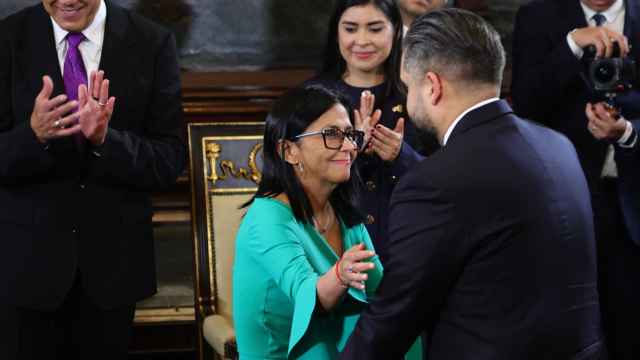The MT Conferences section did not involve the reporting or the editorial staff of The Moscow Times.

Alexander Kosov
Head of Practice for Customs and Foreign Trade Regulation, PhD in Law
Pepeliaev Group
This article provides information on the rules for confirming safety of goods imported to the territory of the Customs Union of the Republic of Belarus, the Republic of Kazakhstan and the Russian Federation.
The main functions of the safety requirements is the protection of 1) life and health of people; 2) property; 3) ecological environment; 4) life and health of animals and plants; 5) prevention of misunderstanding of the consumers; 6) energetic efficiency and resource preservation. The application of the safety requirements for other purposes (e.g. the use of the provisions of the technical regulations in order to substantiate the collection of customs payments, etc.) is not required (Agreement on the single principles and rules of technical regulation in the Republic of Belarus, Republic of Kazakhstan and the Russian Federation dated 18 November 2010 (hereinafter — the Agreement on technical regulation), Art. 4 (2)).
The legislation of the Customs Union on technical regulation establishes single requirements in respect of the conformity confirmation of the goods imported to any of the states of the Customs Union. The general rules are stated by several international agreements, decisions of the Customs Union Commission / Eurasian Economic Commission. Some specific requirements on confirming safety of the equipment and spare parts to it are also stated by the particular technical regulations of the Customs Union. Such CU technical regulations are effective on the territory of the whole Customs Union directly (i.e. no additional legislative or sub-legislative acts have to be issued by the Customs Union or its member-states in order to enforce such technical regulations) (Agreement on technical regulation, Art. 2 (2)).
Responsible person
Following the general rule the conformity to the CU technical regulation may be confirmed by one of the following legal entities, registered on the territory of one of the states of the Customs Union (e.g. in Russia):
• Legal entity, being the producer of the goods;
• Legal entity, being the seller of the goods;
• Legal entity, which has concluded a contract with a foreign producer, providing the right of such legal entity to perform the functions of the foreign producer in the Customs Union and the obligation to become responsible for none-observance of the CU technical regulations (Agreement on technical regulation, Art. 7 (2)).
The conformity declaration in respect of the goods, produced in one state of the Customs Union and shipped to another state of the Customs Union (i.e. in mutual/internal trade with respect to the goods, originating from the states of Customs Union) may be issued by 1) the producer; 2) by the supplier of the state of destination, whichever is envisaged by the national legislation of the state of the Customs Union. The latter legal entities are responsible for the observance of the CU technical regulations (Agreement on circulation of products, subject to obligatory conformity confirmation on the customs territory of the Customs Union dated 29 December 2009 (hereinafter — the Agreement on circulation of products), Art. 6 (1 and 2)).
However, in practice, the party responsible for the observance of the confirmation of conformity is determined on a case-by-case basis and depends on the conformity confirmation procedures and schemes applied under the import of the particular goods into Russia.
Guidelines
The products which are subject to obligatory requirements in frame of the Customs Union are indicated in the Single List stated by the Decision of the Commission of the Customs Union No. 526 dated Jan. 28, 2011 (hereinafter — the Conformity list). In respect of all these products the CU technical regulations should be issued. The conformity requirements, established by the national legislation of the states of the Customs Union, should be applied to these products till the respective CU technical regulations come into force (Agreement on technical regulation, Article 5 (Parts 3)). The states of the Customs Union should not establish any conformity requirements with respect to the goods that are not included into the above Conformity list (Agreement on technical regulation, Article 3 (Parts 1, 3 and 4) and Article 4 (Part 1)).
If the CU technical regulation is established to the respective type of products, the unified conformity documents may be obtained in respect of them on the form stated by the Decision of the Commission of the Customs Union No. 293 dated Dec. 25, 2012.
The products in respect of which the same conformity requirements are applied in all three member states of the Customs Union, but in respect of which the CU technical regulation has not been issued, are included into the Single list established by the Decision of the Commission of the Customs Union No. 620 dated April 7, 2011 (hereinafter the Single List). In respect of these products the certificates and declaration of conformity according to the unified forms may be also obtained. The forms of the above documents are established by the Decision of the Commission of the Customs Union No. 319 dated June 18, 2010. These forms differ from forms established by the Decision of the Commission of the Customs Union No. 293 dated Dec. 25, 2012.
Please note that in respect of such products (i.e. included into the Single list) the certificates and declaration of conformity in accordance with the national legislations of member States of the Customs Union may be also issued on the choice of the applicant. As soon as the CU technical regulation is established with respect to such products, they are excluded from the Single list and are subject to the respective CU technical regulation since the date it comes into force (Agreement on technical regulation, Article 3 (Part 2)).
The products which are included into the Conformity list, but not included into the Single list (i.e. the conformity requirements applied in respect of such products are different in member states of the Customs Union), are subject to obligatory assessment (confirmation) of conformity according to the national legislation of the member states of the Customs Union. In Russia the list of such goods is stated by the Resolution of the Government of the Russian Federation No. 982 dated Dec. 1, 2009 and the Information provided by the Federal Customs Service which is published on its official WEB-site (ved.customs.ru).
The product, which is subject to CU technical regulations, may be released for circulation on the territory of any of the states of the Customs Union only under the condition that the safety/conformity of such product is confirmed in accordance with the requirements of the respective CU technical regulation (Agreement on agreed politics, Article 6 (1); Agreement on technical regulation, Article 2 (3) and Article 7 (1)), excluding, in particular, the following:
• Goods which were in use (operation);
• Goods imported in single instances (amounts), provided by one foreign trade contract exclusively for own use of the declarant (including for research or representative purposes in as a gift or advertising materials);
• Samples which are imported for testing and examinations for certification purposes under the condition of providing the respective agreement with the authorized test laboratory (center);
• Goods which are declared under the temporary import customs procedure and which are intended for carrying out of tests, examinations, experiments;
• Spare parts for maintenance or repair of the finished product which compliance with the requirements on safety has been confirmed before;
• Etc.
EEC is authorized to establish the list of the international, regional and national standards to be applied to perform research (tests), measurements and sample selection under the performance of the conformity assessment (Agreement on technical regulation, Article 6 (3)). The CU technical regulations may also establish the list of international, regional and/or national standards of the states of the Customs Union the observance of which is not obligatory. However, if such standards are observed on voluntary basis it should be considered as the observance of the respective CU technical regulations. Irrespectively of the above, none-observance of such standards should not be considered as none-observance of the CU technical regulations (Agreement on technical regulation, Article 6 (2) and Article 7 (3); Agreement on policies, Article 6 (2)).
Forms of assessment of conformity of the goods to the requirements of the CU technical regulations
Following the general rule assessment of conformity of the goods subject to the respective CU technical regulations may be performed via one of the following forms:
• Registration;
• Tests;
• Conformity confirmation in the following forms:
Conformity declaration;
Certification.
• Expertise;
• Other forms, established by the CU technical regulations.
The conformity assessment (confirmation), including certification/registration of the conformity declaration, is performed by the certification authorities, included to the Single register of the certification authorities and test laboratories of the Customs Union (http://www.tsouz.ru/db/techregulation/Pages/link1.aspx). Any research (tests) of the goods should be performed by the laboratories (centers), included to the above Single register as well (Agreement on technical regulation, Article 8 (1 and 2)).
The MT Conferences section did not involve the reporting or the editorial staff of The Moscow Times.
A Message from The Moscow Times:
Dear readers,
We are facing unprecedented challenges. Russia's Prosecutor General's Office has designated The Moscow Times as an "undesirable" organization, criminalizing our work and putting our staff at risk of prosecution. This follows our earlier unjust labeling as a "foreign agent."
These actions are direct attempts to silence independent journalism in Russia. The authorities claim our work "discredits the decisions of the Russian leadership." We see things differently: we strive to provide accurate, unbiased reporting on Russia.
We, the journalists of The Moscow Times, refuse to be silenced. But to continue our work, we need your help.
Your support, no matter how small, makes a world of difference. If you can, please support us monthly starting from just $2. It's quick to set up, and every contribution makes a significant impact.
By supporting The Moscow Times, you're defending open, independent journalism in the face of repression. Thank you for standing with us.
Remind me later.





